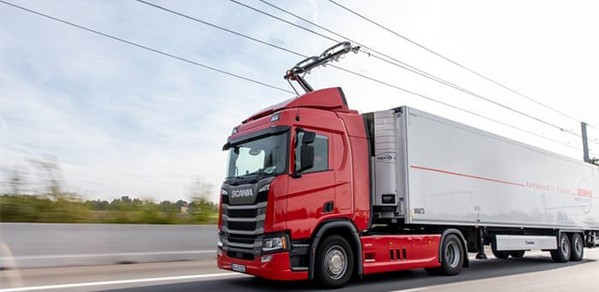
The Centre for Sustainable Road Freight – a collaboration between the University of Cambridge, Heriot-Watt and Westminster Universities and a consortium of industry partners – is part of a team that has been awarded government funding to design a large-scale electric road freight system demonstrator.
The technologies this consortium is working on could be deployed in most countries once demonstrated, supporting the global move towards greener logistics.
Professor David Cebon
The feasibility study is part of £20 million funding awarded by the Department for Transport and delivered by Innovate UK, to boost the UK’s transition to zero emission road freight. The project team includes Siemens Mobility, Scania, Costain, The Centre for Sustainable Road Freight, ARUP, Milne Research, SPL Powerlines, CI Planning, BOX ENERGI and Possible.
The consortium will lead a major UK study on the electrification of long-range trucks with dynamic charging, using overhead wires on motorways.
The project will investigate the feasibility of building a 20km stretch of overhead contact lines on a UK motorway, to power long-haul HGVs using Siemens ‘eHighway’ technology. The system will be connected to logistics facilities at either end, to demonstrate end-to-end electrification of logistics: from port to depot to city centre.
The consortium has proposed this system as the fastest, lowest carbon and most cost-effective route to decarbonising the UK road freight industry and to deliver cleaner air and quieter motorways. The nine-month study, which began last month, could be the forerunner of a scheme that aims to see the UK’s major roads served by overhead lines by the late 2030s. These eHighways allow specially-adapted trucks to attach to the overhead wires and run using the electricity, similar to rail and trolley-bus systems. The trucks come equipped with a battery that charges while they are in motion, so that they can detach in order to not only overtake vehicles, but also to reach their final destination with zero emissions from start to finish.
Professor David Cebon, Director of the Centre for Sustainable Road Freight, said: “Our previous research indicates that overhead catenary power will provide the lowest cost, lowest carbon, and most rapidly deployable solution to decarbonise long-haul road freight in the UK. This project will test the concept at the next level of detail. Moreover, the technologies this consortium is working on could be deployed in most countries once demonstrated, supporting the global move towards greener logistics.”
Alistair Barnes, Innovation Lead for Zero Emission Vehicles at Innovate UK, said: “We’re delighted this consortium is bringing its extensive experience to solve challenges around decarbonising HGVs by planning to demonstrate this technology at scale on UK roads. Innovate UK is proud to be supporting this project as part of its partnership with the Department for Transport.”

